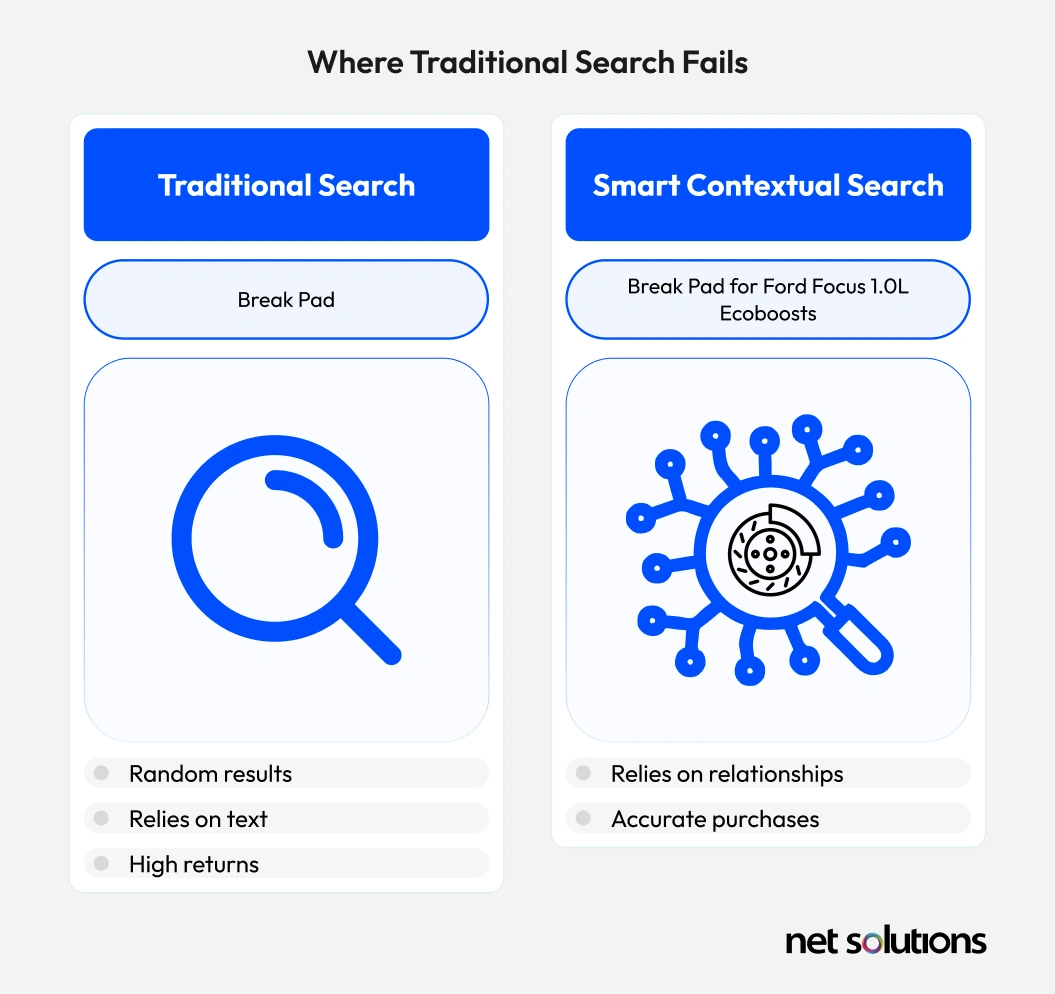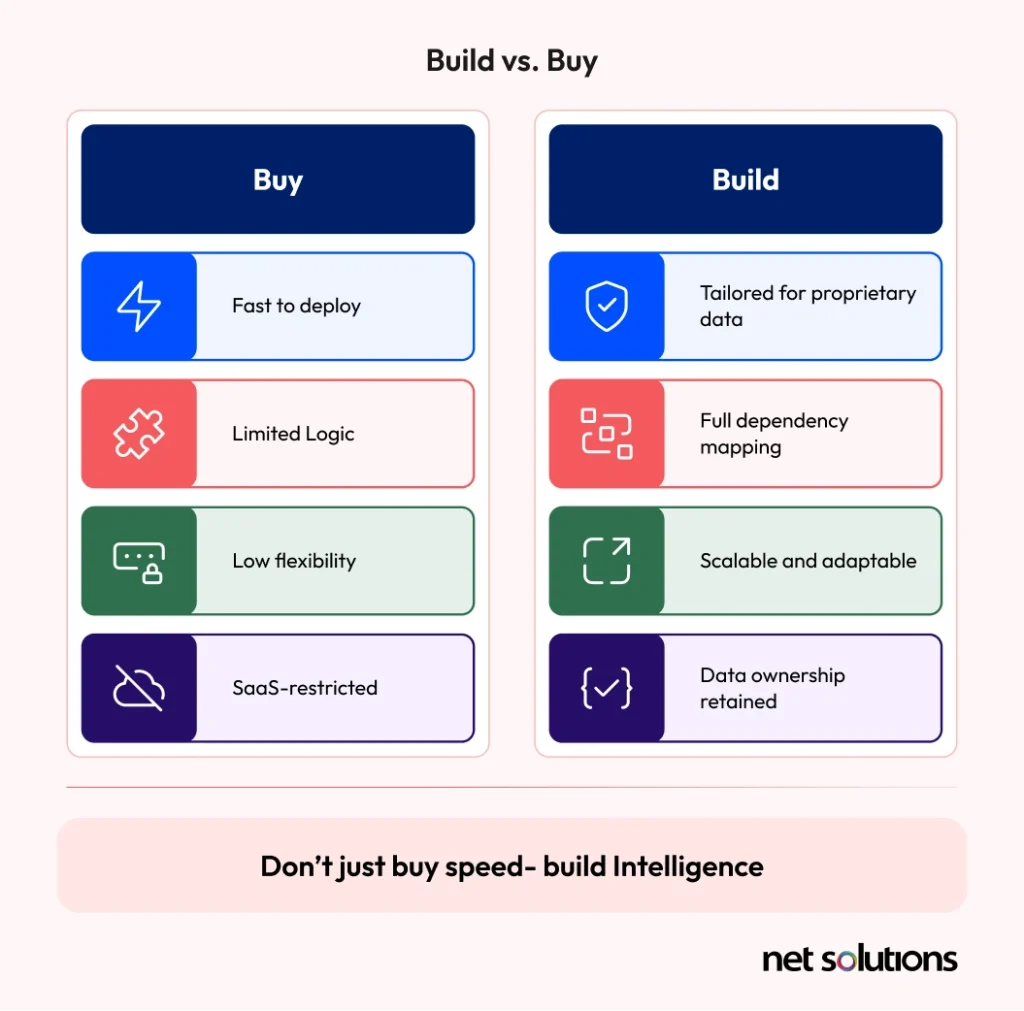Imagine you’re upgrading your PC. You search for a “graphics card” online, find one, and click “buy.” A week later, it arrives, but it is not useful to you. You discover that it doesn’t fit your specific motherboard, or worse, you needed a special power connector that wasn’t included. Frustration mounts, the part goes back, and a potential loyal customer is lost.
This isn’t an isolated incident. It’s a pervasive problem across entire industries where product fitment and technical dependencies are paramount. This challenge plagues businesses selling products that aren’t standalone, universal items. Think about:
- Sports Equipment Sales: Upgrading a bicycle’s drivetrain isn’t just about buying a new cassette; it involves checking compatibility with the chain, derailleur, and frame, often requiring specific tools for installation.
- Electronic Component Sales: Building a custom PC or repairing a circuit board involves knowing not just that a component exists, but that it’s compatible with other components (e.g., CPU socket type, RAM generation, power supply wattage) and often requires specific connectors or thermal paste.
- Automotive Aftersales: You can’t just buy a spark plug; you need the right spark plug for your specific car’s make, model, year, and engine size. Even then, an oil filter may require a specific gasket.
- Fishing Gear: A new fishing reel may require a specific rod, line weight, or even a specialized tool for maintenance, all of which depend on the type of fish you’re targeting or the environment in which you’re fishing.
In these industries, a “usual search” experience, like those for groceries or clothing, falls short. Traditional eCommerce search engines are excellent at finding items by keyword (“red dress”) or filtering by simple attributes (“size large”). But they fundamentally struggle with:
- Contextual Fitment: Understanding that “brake pad” means nothing without knowing “for a 2018 Ford Focus, 1.0L EcoBoost.”
- Electronic Component Sales: Knowing that installing that brake pad requires a new caliper bolt kit, or that replacing a timing belt demands a water pump replacement.

Without this intelligence, businesses face higher return rates, frustrated customers, and lost opportunities for upselling and cross-selling. It’s a multi-billion-dollar problem waiting for a smarter solution.
The Foundation of True Intelligence: Core Building Blocks for a Smart Solution
To move beyond generic search and unlock the potential of contextual sales, we need a technical solution that can truly “understand” products and their relationships. This isn’t just about faster searching; it’s about smarter recommending and preventing bad purchases.
At its heart, a technically strong solution for applicated search requires two core capabilities:
- Precise Fitment Matching: Accurately linking a specific product to a specific application (e.g., “Part X fits into product Y”).
- Deterministic Dependency Mapping: Understanding and enforcing the technical relationships between parts (e.g., “To install Part X, you need Part Y and might need Part Z”).
Many popular eCommerce and AI tools, while powerful in their domains, are simply not built for this specific challenge.
- Standard eCommerce search engines in Magento or Shopify:These are fantastic for managing product catalogs and fulfilling basic keyword searches. However, they’re designed for speed and relevance based on text, not for traversing complex, multi-level technical relationships. You can filter by “make” and “model,” but the underlying data structure isn’t optimized to tell you that “this particular brake caliper requires this specific type of mounting bolt for this car.”
- Behavioral recommendation engines like Adobe Sensei or Algolia Recommend: These AI systems excel at predicting what you might like based on what others have bought (“Customers who bought X also bought Y”). This is brilliant for suggesting complementary items in fashion or electronics. But when it comes to a safety-critical car part, “people who bought this tire also bought this bolt” is a probabilistic guess, not a hard-and-fast technical requirement. It cannot guarantee fitment or provide critical “must-have” items.
Why We Need a “Knowledge Graph” and Graph Databases
The solution lies in creating a “Knowledge Graph.” This isn’t just a fancy term; it’s a fundamentally different way of structuring information that mirrors how we intuitively understand complex systems.
Imagine a network of interconnected points. Each point is an “entity” (a specific CPU, a Motherboard, a RAM Module, a Graphics Card). The lines connecting these points represent the “relationships” between them (e.g., a “CPU” FITS a “Motherboard,” and that “Motherboard” REQUIRES a “RAM Module” to function). This entire network is a Knowledge Graph.
The ideal technology for building and querying such a Knowledge Graph is a Graph Database. Unlike traditional databases that excel at tables, Graph DBs are purpose-built for navigating these relationships with unparalleled speed.
When a customer searches for a “CPU” for their “Gaming PC build,” the Graph DB can instantly:
- Confirm that “CPU X” FITS “Motherboard Y.”
- Traverse the graph to find all “RAM Module A” that are REQUIRED to work with “CPU X” on “Motherboard Y.”
- Identify “Graphics Card Z” as an item that SHOULD BE PAIRED WITH “CPU X” for optimal gaming performance.
- This multi-step, relationship-driven query, which would grind a relational database to a halt, is Graph DB’s native strength.
Leading Graph Databases like AWS Neptune and Neo4j enable us to effectively leverage proprietary business data that has the interconnected relationships of its products database. These graph databases are pivotal in helping businesses harness the power of their complex, interconnected data. Among these, AWS Neptune stands out as Amazon’s fully managed service, meticulously optimized for cloud-scale operations and peak performance. Its robust architecture allows for efficient querying of highly connected datasets, making it ideal for applications like fraud detection, social networking, and knowledge graphs.
Similarly, Neo4j, a widely adopted open-source solution, offers an intuitive experience through its powerful Cypher query language. Its vibrant and extensive ecosystem, coupled with strong community support, provides a flexible and scalable platform for managing and analyzing relationships within data. Both Neptune and Neo4j empower organizations to uncover hidden patterns and insights from their data, driving better decision-making and fostering innovation.
The Path Forward: Why “Build” and not just “Buy” a solution
Given the unique and complex nature of the contextual search problem, a purely “buy” or “configure-only” approach using off-the-shelf SaaS solutions will not fully address the challenge. Instead, the most compelling and strategically sound path is a Hybrid Approach: build the specialized search engine and integrate it with best-in-class “bought” solutions for the front-end user experience.
Why a Pure “Buy” Fails the Core Problem:
- Proprietary data is undervalued: Off-the-shelf SaaS solutions are not designed to natively ingest and process intricate, deterministic, and often proprietary dependency relationships of a business. Trying to force this data into a standard search index is like using a sledgehammer to drive a screw – it won’t work well and risks damaging the valuable data.
- No “Off-the-Shelf” Graph DB SaaS: There isn’t a widely available SaaS platform that offers a configurable Graph Database for complex product dependencies accessible via simple, business-user-friendly settings.
- Limits to true intelligence: While SaaS search tools like Algolia offer fantastic speed and filtering, and AI tools like Adobe Sensei provide excellent behavioral recommendations, neither offers the underlying deterministic technical logic that ensures a customer must buy Part Y to properly install Part X.
By choosing to build a dedicated core search microservice, we gain several critical advantages:
- Maximize your data asset: The custom-engineered solution is designed to understand every nuance of your specific dependency relationships, turning raw data into a powerful, intelligent selling tool.
- Achieve true accuracy and reduce returns: The graph database ensures that recommendations are not just suggestions but technically accurate and often mandatory requirements. This dramatically reduces customer frustration, costly returns, and negative brand perception stemming from incorrect purchases.
- Unlock massive upsell/cross-sell potential: By intelligently presenting required and highly recommended complementary parts at the point of sale, you transform a single-part purchase into a complete, correct repair or upgrade solution. This significantly boosts Average Order Value (AOV) without relying on guesswork.
- Future-Proofing and Scalability: A custom-built microservice, using robust technologies like AWS Neptune or Neo4j, is highly scalable and adaptable. As new parts, vehicles, or dependency rules emerge, the search engine can be updated and expanded without being limited by a third-party SaaS provider’s feature set.

The optimal solution is to build a component-centric search solution using a Graph Database like AWS Neptune to house your in-house product intelligence. This then integrates seamlessly with existing or new best-of-breed SaaS solutions:
- Search and filtering frontend: A lightning-fast service like Algolia handles the initial keyword search, typo correction, and general fitment filtering.
- Behavioral recommendations: Platforms like Adobe Commerce (with Sensei) can manage the overall eCommerce experience, customer personalization, and handle recommendations for general buying trends.
This integrated approach gives you the best of both worlds: the agility and user experience of leading SaaS platforms, combined with the deep, proprietary intelligence that only a custom-built solution leveraging your unique data can provide. It’s the key to transforming the complex challenge of component search into a powerful engine for sales growth and customer satisfaction.



